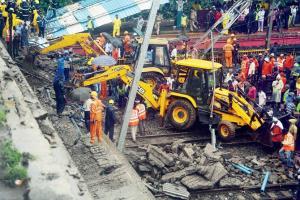While BMC and NDRF teams begin manual rescue and relief work immediately, heavy machinery arrives to clear debris 4 hours later

BMC deployed three hydra cranes, and two others were pulled in at the spot from private agencies. Fast line services resumed in 12 hours. Pic/Sayyed Sameer Abedi
Man got a leg up on machine during the rescue and relief operations of Tuesday's Gokhale bridge collapse. While the fire brigade and the National Disaster Relief Force (NDRF) began operating manually, it was the machinery that delayed the operation.
ADVERTISEMENT
Further, railway authorities, focused on starting trains at the earliest, could not do any work until the debris was cleared, and were thus upset at the pace the two agencies were doing their work. While heavy machinery - JCBs, hydras and other cranes - could not be used at the spot initially, they reached there almost four hours after the disaster, starting work only around 12.30 pm.
Speeding it up
BMC had deployed three hydra cranes, and two others were pulled in at the spot from private agencies. In addition to this, there were six JCBs, six dumpers and 10 gas cutters.
Prashant Gaikwad, assistant municipal commissioner, K-west ward, who was present at the spot, said, "The cranes had arrived well in time but could not be used until the collapsed slabs were broken on the ground. Rain was also a factor in the machinery reaching a little late, but we did all the work at high speed, so that the main lines of the railways could be restored."
"While the people trapped under the debris were removed by 10.30 am, the manual work on clearing the debris, coupled with rain and the difficulties to deploy the machines on the tracks, made our job difficult," said an official.
Railways unimpressed
The disaster relief was largely carried out the fire brigade and NDRF, despite the railways not allowing other agencies to enter their premises for any kind of work. In the manual teams, 250 labourers and a 45-member team of the NDRF were deployed at the spot. The railways was anything but impressed.
A railway official present at the spot said, "The NDRF team, which is known for quick relief, was not up to the mark. Had they been able to clear the debris in time, we could have got more time to work on our main line. Owing to this delay, commuters had to suffer."
NDRF officials told mid-day they'd got a call about the accident around 8 am, and in 20 minutes, the team of 45 reached the spot and rescued five, who were taken to Cooper Hospital. On being told railway officials were not happy with NDRF's pace of work, Mahesh Nalawade, NDRF deputy commandant, said, "All was done as soon as possible ...Our job is to search for people, so we should not be blamed for delay in lifting debris."
Also read: Mumbai Rains: How a bunch of cables brought the city to its knees
 Subscribe today by clicking the link and stay updated with the latest news!" Click here!
Subscribe today by clicking the link and stay updated with the latest news!" Click here!






